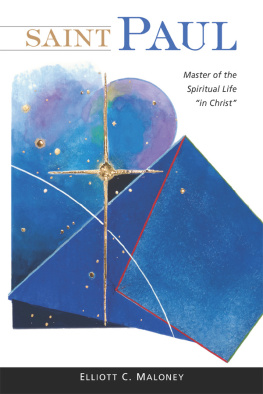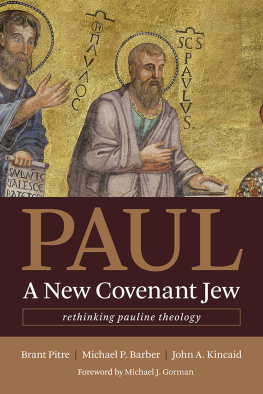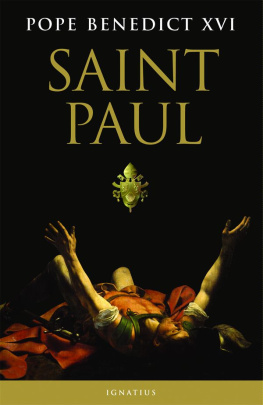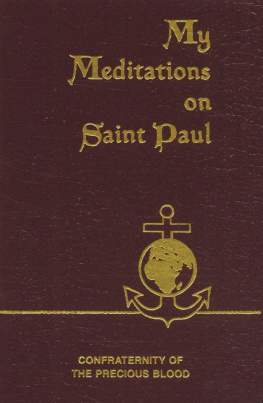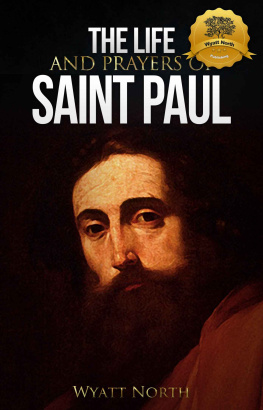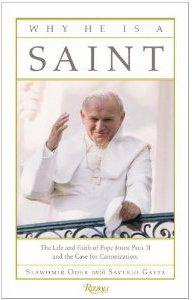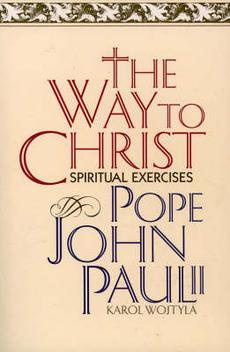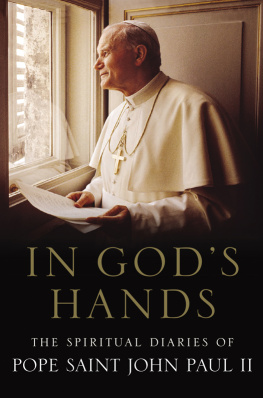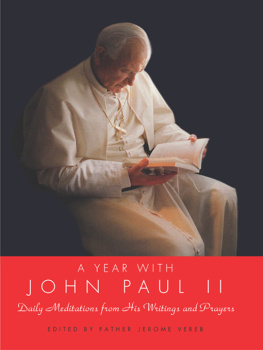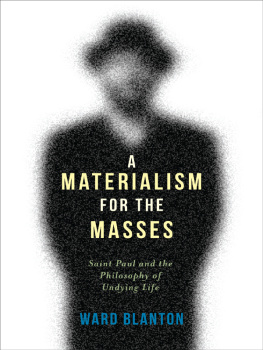Preface
As far back as 2007, after many years of teaching the New Testament, I began to feel something was missing in the usual approach to Pauline studies in textbooks, college classes, and even seminaries. Although my main scholarly focus was on the Gospel of Mark, I had been teaching surveys on the Pauline corpus for almost thirty years. Even so, I knew that I didnt really have a handle on what the great saint says about the spiritual life in the day-to-day activities and concerns of Christiansabout how people should live in covenant relationship with God, committed to seeking Gods will in every aspect of their lives.
Spirituality is a popular topic among Christians and others, but it is often treated as something separate from ordinary life, or as only a part of life on some higher level when compared to the ordinary. Furthermore, even Catholic scholarship, notable as it is in Pauline exegesis and theology, can sometimes lack a certain feel for the kind of living Paul wanted for his communities and so miss out on his wisdom for modern-day Christian living.
For Paul, all of a believers life is the spiritual life; the alternative is a life according to the flesh, a self-centered life without God, a continual spiritual death. Surely my life in our Benedictine monastery here at Saint Vincent Archabbey had a lot to do with the question of how to live as Paul imagined a Christian would, especially since our Rule depends so heavily upon Scripture for its inspiration as a school of the Lords service (Rule of St. Benedict, Prologue). As a matter of fact, now that I look back over more than forty-five years of life as a monk, I wonder why I didnt start asking these kinds of questions much earlier.
Late in 2007, I contracted to teach a course on St. Pauls letters at the Dominican seminary in Ibadan, Nigeria, having already had two very exciting visits to that land of joyful people and painful contradiction. It was then, even before Pope Benedict XVIs announcement of a Year of St. Paul, that I decided to throw myself fully into research and teaching in preparation for writing this book. In the spring 2008 semester I taught my usual two classes on the Pauline letters: a graduate course here at Saint Vincent Seminary and an undergraduate course at the liberal arts college. I also began teaching an online course for Dominican Institute that I would conclude in person in Nigeria after the spring semester ended.
Following my summer in Nigeria, I was granted a study semester to read at the great library of the Pontifical Biblical Institute in Rome and then at Candler School of Theology at Emory University. I was privileged to give three Bible workshops to many of the spiritual leaders of the Catholic Church in Jamaica, and it was there that I came up with the precise topic and an early sketch of what I felt needed to be covered in my book. Thank you Sr. Bernadette! I spent the end of that semester with beloved friends in Brazilscholars, monks, and laypeoplewho always teach me about authentic Christian living. Returning home to St. Vincent, I taught my two St. Paul courses once more and finally started writing in May of 2008. It was just about three years later when I first submitted the manuscript of this book for publication.
How little I knew of St. Paul, even after teaching him for so long! For three years I pondered his letters, reading and rereading them, reading around them, reading about them in so many excellent publications. I taught, gave Bible studies and retreats, had conversations and spoke to our monastic community about St. Paul. And I wrote day and night thinking, asking, and dreaming. Yes, a lot of my best work happened while I was asleep!
I was happy about the Year of St. Paul, since so many fine introductory books on the subject were produced. But this is not an introductory book on the great theologian. I have tried to make this study as accessible as possible to the educated lay reader who has had some introduction to the subject, but I wanted also to help seminarians and theologians to understand St. Paul more clearly, and perhaps even bring something of interest to my peers in biblical scholarship.
In order to begin to understand the subtlety and complexity of the Apostles ideas, one has to look at multiple texts. Paul was always nuancing his great ideas, applying them, fine tuning them, even rethinking .
I must thank too many people to mention here: my teachers, my students, the great Pauline scholars of yesteryear and of today, along with many insightful writers from all over the world. There are two very important people in the process that I want to name and thank here: my confrere Fr. Campion Gavaler, OSB, whose fine insights helped me to clarify several points, and Pastor David Ackerman, whose careful reading of the text was reassuring, helpful, and very exact. Perhaps most important was the support and patience of my Benedictine community during this long process from my awakening to the fact that I knew Paul so poorly to my discouragement at the sheer size of the work I needed to do. Later setbacks from a couple of unwilling publishers required an update of the manuscript to include several important new books. Because of the loving patience of many friends and confreres, I now feel a greater esteem and empathy with the extraordinary Apostle whom I shall from now on simply call Paul.

